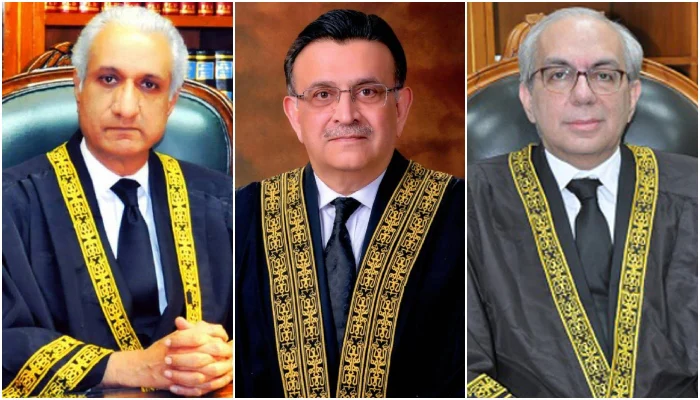- Larger bench to hear review plea under new law.
- CJP Bandial says the situation is “interesting”.
- Court indefinitely adjourns hearing on ECP plea.
ISLAMABAD: The Supreme Court Monday indefinitely adjourned the hearing on the Election Commission of Pakistan’s (ECP) petition against the top court’s order of holding Punjab’s general elections on May 14 after the court was apprised that a law for the review of suo motu judgements had come into effect.
The Supreme Court Review of Judgements and Orders Bill, 2023, came into force Friday after President Arif Alvi’s assent. The law states that for reviewing a suo motu judgement, a bigger bench — than the one that issued the order — will hear the case.
“In case of judgements and orders of the SC in exercise of its original jurisdiction under Article 184 of the Constitution, the scope of review on both facts and law, shall be the same as an appeal under Article 185 of the Constitution,” the law reads.
A three-member bench — headed by Chief Justice of Pakistan Umar Ata Bandial and comprising Justice Ijaz Ul Ahsan and Justice Munib Akhtar — heard the plea.
This is the same bench that issued the April 4 verdict — under Article 184 (3) or the suo motu law. It had directed the commission to hold elections in Punjab in the mid of May and ordered the federal and Punjab governments to provide assistance to the ECP.
Despite the top court’s order, the federal government expressed its inability to provide funds to the election commission and the armed forces had said they could not provide security due to the ongoing law and order situation.
So even with the presence of the order, the polls did not take place on May 14.
‘Happy’ CJP
At the outset of today’s hearing, Attorney General for Pakistan Mansoor Usman Awan told the court that a law for challenging suo motu orders has come into effect.
He added that under the new law’s section 2, the orders issued under Article 184 (3) could be appealed against.
“This law will have retrospective effect,” he noted, at which Justice Akhtar said this is why ECP lawyer Sajeel Swati is smiling.
Responding to the AGP, CJP Bandial said the situation is interesting. He added that the court understands the need for reviewing suo motu orders.
Through the Supreme Court (Practice and Procedure) Act, 2023, the government created a new “judicial jurisdiction”, the CJP noted, adding that the rulers tried intervening with the court’s administrative matters.
“But I am happy that this law [the review act] is only related to Article 184(3).”
The CJP added that “everyone” should reconsider their stance.
“After the May 9 incidents, try to find a silver lining. Try to bridge the differences. Try to bring balance and peace to the system and hold elections through the right procedure.”
Court did not invalidate commission: CJP
Moving on, the CJP told the attorney-general that he must have read the court’s judgement in the audio leaks commission case. “Keep in mind that the court did not invalidate the commission,” CJP Banidal remarked.
It may be noted that the Supreme Court Friday stayed the proceedings of the high-powered judicial commission formed to probe the audio leaks related to the judiciary, as well as the federal government’s notification on the commission’s constitution.
Justice Qazi Faez Isa, when he resumed the proceedings of the audio leaks commission the next day, raised questions over the SC order stopping the judicial panel from working.
Today, CJP Bandial said that the court has to protect the independence of the judiciary.
The top judge remarked that things will not work when secret meetings take place.
“It is a historical accident that there is only one chief justice,” he added.
The CJP said that the court had seen the notifications for the Memogate Commission, Abbottabad Commission and the commissions set up in the Shahzad Saleem murder case. He said that all the judicial commissions are constituted at the will of the chief justice.
“If you want to investigate something, it should be done through proper procedures. I will not form a commission consisting myself,” he added.
The top judge also gave the option of investigations through another judge, saying that “this political temperature will not improve livelihood and law and order”.


 Latest News3 days ago
Latest News3 days ago
 Latest News3 days ago
Latest News3 days ago
 Entertainment3 days ago
Entertainment3 days ago
 Latest News3 days ago
Latest News3 days ago
 Latest News3 days ago
Latest News3 days ago
 Latest News3 days ago
Latest News3 days ago
 Latest News3 days ago
Latest News3 days ago
 Latest News3 days ago
Latest News3 days ago























